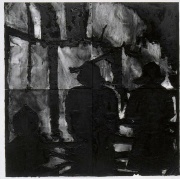Difference between revisions of "Tar"
m (Text replace - "== Authority ==" to "== Sources Checked for Data in Record ==") |
m (Text replace - "\[http:\/\/cameo\.mfa\.org\/materials\/fullrecord\.asp\?name=([^\s]+)\s(.*)\]" to "$2") |
||
| Line 2: | Line 2: | ||
== Description == | == Description == | ||
| − | A viscous, black oily liquid obtained from the distillation of [ | + | A viscous, black oily liquid obtained from the distillation of [[peat|peat]], [[wood|wood]], or [[coal|coal]]. Tar has been used as a caulk on wooden sailing ships, a waterproofing agent for roofing papers, a sealant for asphalt roads, a preservative for outdoor wood and an [[insecticide|insecticide]]. It is also used in some disinfectant [[soap|soaps]]. Some tars, such as those obtained from [[pine|pine]] or [[beech|beech]] wood, have been mixed with [[linseed%20oil|linseed oil]] to form a dark brown glaze (White, 1986). |
== Synonyms and Related Terms == | == Synonyms and Related Terms == | ||
Revision as of 11:43, 10 May 2016
Description
A viscous, black oily liquid obtained from the distillation of Peat, Wood, or Coal. Tar has been used as a caulk on wooden sailing ships, a waterproofing agent for roofing papers, a sealant for asphalt roads, a preservative for outdoor wood and an Insecticide. It is also used in some disinfectant soaps. Some tars, such as those obtained from Pine or Beech wood, have been mixed with Linseed oil to form a dark brown glaze (White, 1986).
Synonyms and Related Terms
creosote; alquitrán (Esp.); goudron (Fr.); tjære (Dan.); Teer (Deut., Ned.); tjära (Sven.); alcatrão (Port.)
Examples include: coal tar; mineral tar; pine tar; wood tar; birch bark tar
Other Properties
Soluble in ether, chloroform, ethanol, carbon disulfide.
| Density | 1.02 |
|---|
Hazards and Safety
Toxic by ingestion and inhalation. Skin contact may cause irritation. Combustible.
Additional Information
R.White "Brown and Black Organic Glazes, Pigments and Paints" National Gallery Technical Bulletin, 10:58-71, 1986.
Sources Checked for Data in Record
- G.S.Brady, Materials Handbook, McGraw-Hill Book Co., New York, 1971 Comment: p. 800
- Ralph Mayer, A Dictionary of Art Terms and Techniques, Harper and Row Publishers, New York, 1969 (also 1945 printing)
- John S. Mills, Raymond White, The Organic Chemistry of Museum Objects, Butterworth Heineman, London, 2nd ed., 1994
- Encyclopedia Britannica, http://www.britannica.com Comment: "coal tar" Encyclopædia Britannica Premium Service. [Accessed 28 Sept. 2005].
- Wikipedia, the free encyclopedia, at http://www.wikipedia.com Comment: http://en.wikipedia.org/wiki/Tar (Accessed Sept. 28, 2005)
- CRC Handbook of Chemistry and Physics, Robert Weast (ed.), CRC Press, Boca Raton, Florida, v. 61, 1980 Comment: density=1.02
- Richard S. Lewis, Hawley's Condensed Chemical Dictionary, Van Nostrand Reinhold, New York, 10th ed., 1993
- Random House, Webster's Encyclopedic Unabridged Dictionary of the English Language, Grammercy Book, New York, 1997
- The American Heritage Dictionary or Encarta, via Microsoft Bookshelf 98, Microsoft Corp., 1998
- Art and Architecture Thesaurus Online, http://www.getty.edu/research/tools/vocabulary/aat/, J. Paul Getty Trust, Los Angeles, 2000
